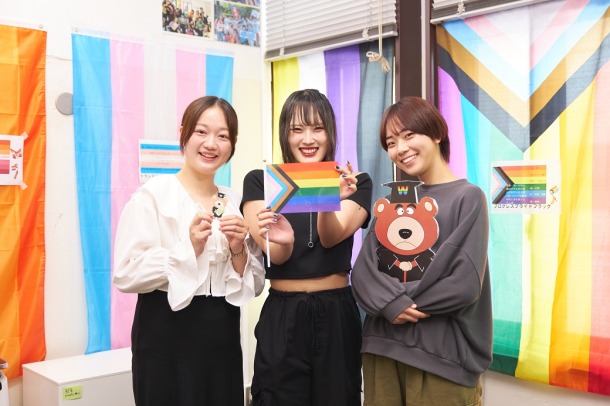
At Gender and Sexuality Center Annex Building No. 10 Waseda Campus. From left: Watanabe, Mochi, and Haru
Student club and extracurricular activities are based on the voluntary activities of students. Have you ever thought about the fact that there are people who feel uneasy about these activities, or who find it difficult to participate in them in the first place, because of gender and sexuality, even though these activities are an essential part of student life?
This time, we conducted a survey on "Inclusion of gender and sexuality diversity in activities at student club and club activities" to Waseda Weekly's Waseda University student reader monitors. Based on the responses, Waseda Weekly reporters visited the Gender and Sexuality Center to discuss "what problems exist today" and "what should be done in the future" in terms of gender and sexuality diversity! We interviewed two student staff members.
What can you do right now to promote diversity and inclusion?
Think with Gender and Sexuality Center student staff
Waseda Weekly Reporter (SJC student staff)
Shino Watanabe 3rd year student, School of Education
Watanabe
I've taken a lot of gender-related classes, so I knew about Gender and Sexuality Center, but I felt it was a little intimidating and never participated in an event. Gender and Sexuality Center holds events such as "Meetings to consider student club /club activities that are inclusive of diverse genders and sexualities," but I'm curious about what motivates people to participate. As a university, I think it's necessary to reach out to groups that aren't interested in diversity, so I'd like to ask about that as well!
Gender and Sexuality Center Student Staff
Mochi, 2nd year student School of Culture, Media and Society
Haru, 1st year School of Humanities and Social Sciences
(※1) Student staff at Gender and Sexuality Center use Gakusta (student staff) names.
Left: Waseda University Diversity Promotion Declaration Mochi decided to enroll in the university because she felt she could live her university life with peace of mind.
Photo on the right: Haru is It doesn't matter what an old man's pants are like!" (Tokai Television Broadcasting) made her want to increase her knowledge about gender and sexuality.
Some people feel confused or frustrated in student club and extracurricular activities
Watanabe: First of all, what does it mean to "include gender and sexual diversity in student club and extracurricular activities"?
Mochi: It means an environment that assumes the existence of people other than cisgender (※2), heterosexual (※3), heteroromantic (※4), allosexual (※5), and alloromantic (※6). For example, there are people whose gender identity is different from the one they were assigned at birth, people who are attracted to people of the same gender as themselves, and people who do not have romantic or sexual feelings toward others.
(※2) A person whose gender identity matches the sex assigned to them at birth.
(※3) A person who primarily identifies as female or male and is sexually attracted to people who have a different gender identity than their own.
(※4) A person who primarily identifies as female or male and feels romantic attraction to people with a different gender identity than their own.
(※5) A person who feels sexual attraction to others.
(※6) A person who feels romantic attraction to others.
Watanabe: I see. So from that perspective, what are some of the areas that actually need improvement?
Mochi: In the survey, some people said they did not like talking about their romantic situations in their clubs. I have also been asked "Do you have a boyfriend?" by someone who I had just met. I think there are some things, like this, that need to be improved. There are several issues with this; firstly, they assume that I am alloromantic, secondly, they unilaterally define me as a woman based on my appearance, and thirdly, they impose the stereotype of heterosexuality. LastIy, I think that "it would be better to ask the other person if it is okay to talk about romantic situations in the first place.”
Also, if new students want to join a dance or other performance-based, athletic club, or any other extracurricular activities, but when they try it out, and don't feel comfortable changing in front of other people, they may have trouble feeling safe if there are only two changing areas, one for women and one for men. In the current situation, that person has no choice but to wear clothes that don't require changing, or give up on joining a club or extracurricular activity.
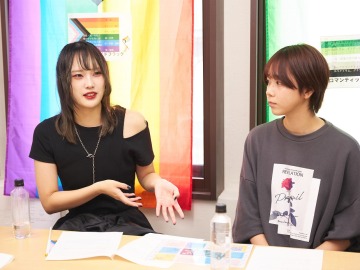
Haru: Looking at the responses to the survey, it seems that there are some assumptions such as "women eat less because they are women" and "men have to carry heavy things because they are men". I don't like the "ladies first" thing... When I'm carrying something heavy, men carry it for me and say "girls don't have to carry it". I know they're doing it out of kindness, but I'm not weak so I can carry it myself, and more than anything, I feel frustrated that I can't take on the role of "carrying heavy things" which is a role that can be useful to others just because I'm a woman.
What should we do about love stories?
Watanabe: I'm also the type who gets confused in the same situation. Also, at a drinking party, I heard someone say, "People who don't fall in love are weird," and I was shocked by that assumption. I still wonder how I should have responded at that time.
Haru: Especially when meeting someone for the first time, people tend to struggle to come up with a topic to talk about, and tend to follow a template conversation, such as "Show me your timetable" or "What does student club do?" Talking about love is not a bad thing, but I'm sure there are many people who have felt uncomfortable talking about it. However, it's difficult to point out the other person's feelings given the relationship and situation. I also couldn't find the courage to point out such situations during student club 's welcome period.
Mochi: If it were me, I might ask that person, "Eh, why? If there are people who fall in love, surely there are people who don't?" I think it's important to break down the stereotypes of people around you little by little through casual conversations like that.
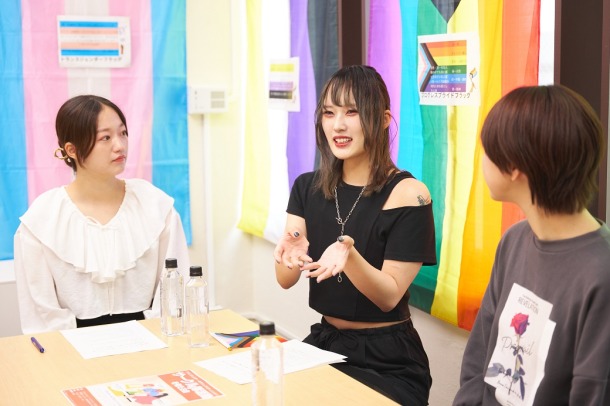 Watanabe: In that case, instead of pointing out "that's not good," asking "why?" like Mochi-san might be a good way to make the other person aware of the issue. Is there anything else we can do to embrace gender and sexual diversity?
Watanabe: In that case, instead of pointing out "that's not good," asking "why?" like Mochi-san might be a good way to make the other person aware of the issue. Is there anything else we can do to embrace gender and sexual diversity?
Mochi: Looking at the survey, many people answered that there were no particular issues or that they had never really thought about it when it came to gender and sexuality issues in student club activities, but I think it's difficult to improve the environment if many people remain unaware of the issues. In particular, there are hierarchical relationships in student club and extracurricular activities, so even if someone is having trouble, it can be difficult for them to tell others. For that reason, I want people to know that there are various issues, such as people who are not good at talking about love, or people who find it painful to be forced into binary gender stereotypes.
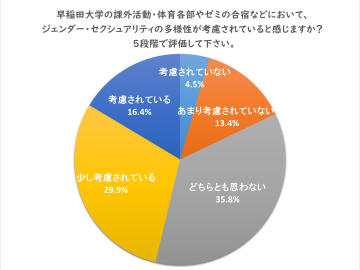
In the Waseda Weekly Reader Monitor Survey conducted in October 2024, the most common response was "I don't think so either way."
Haru: Actually, I had never really thought about gender and sexuality until I entered university, and as I learned more and more, I became very scared, thinking, "Maybe my words and actions have hurt someone without me realizing it." But you can't do anything about what you don't know, and the important thing is how you change when you realize it. I hope that after reading this article, you will also think about what you should do from now on.
Just by making an effort to rephrase a few things, you can make a big difference!
Mochi: Another easy first step is to change the question "Do you have a boyfriend?" to "lover" or "partner." Also, some people aren't comfortable talking about sexual matters, so it's important to ask the other person if it's okay to talk about it and make sure there are no other people around when you talk, from the perspective of "sexual consent."
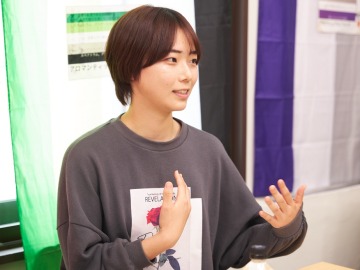 Haru: I am still immature and often unable to behave appropriately, but acting on the assumption that there are LGBTQ+ people, such as "I'll do this if there are LGBTQ+ people" or "I'll stop if there are people who don't like talking about love," is creating an escape route that allows me to excuse my own actions, so I try to act on the assumption that those people exist. I think that doing so will lead to a comfortable environment for everyone.
Haru: I am still immature and often unable to behave appropriately, but acting on the assumption that there are LGBTQ+ people, such as "I'll do this if there are LGBTQ+ people" or "I'll stop if there are people who don't like talking about love," is creating an escape route that allows me to excuse my own actions, so I try to act on the assumption that those people exist. I think that doing so will lead to a comfortable environment for everyone.
Also, although we are often told "what not to do," there are few opportunities to see good examples. So, it's a good idea to start by watching TV programs such as dramas that recognize gender and sexuality diversity and thinking about how to act and using them as reference!
Mochi: It's very sad that you can't do activities because the environment is not right, or that you have to do it while feeling suffocated. As the vice-general of the "Waseda University Dance student club" (registered student club), I was in a position to manage student club. I thought it was important for the club management to provide options, such as reserving facilities with "everyone's toilets" for practice, and providing private rooms and individual baths for those who requested them at training camps, assuming that there are people who don't want student club use large rooms or public baths, or do n't want others to see them changing, and I put this into practice.
One of the reader monitors said, "I can't find a 'universal toilet'." For example, community centers often have gender-neutral toilets, so I recommend checking when looking for a place!
How to use Gender and Sexuality Center: Book lending, individual consultations, and even events!
Watanabe: Gender and Sexuality Center provides a variety of support services. What kind of activities do you want to do in the future?
Haru: I'm interested in entertainment, so I'd like to use dramas and other media to create an opportunity for more people to think about gender and sexuality. Also, there are many books in Toyama Campus Waseda University Student Center (Building No. 30) Gender and Sexuality Center Main Building, and you can check what books are available on the book list! They are also available for loan, so if there is anything you are interested in, please feel free to come and visit.
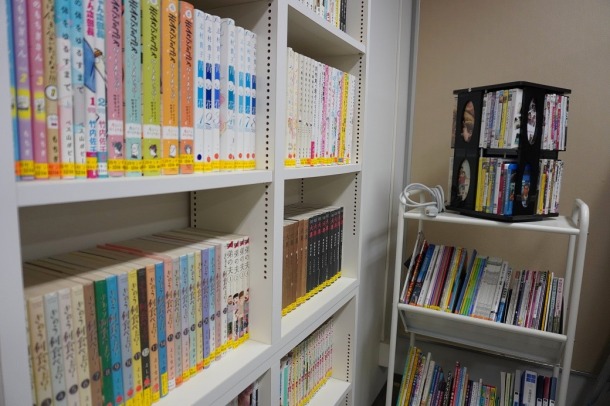
Gender and Sexuality Center main building has a wide selection of books on gender and sexuality, as well as manga and DVDs.
Mochi: I wanted to create an environment where it was easier to seek advice about sexually transmitted diseases, contraception, and sexual and reproductive health and rights, so in April 2024, I made and distributed condoms to "Support Sexual Wellness at Waseda University." They were gone in a flash, though. I'd like to continue this kind of project in the future.
Photo on the left: The back of a condom, which states that Gender and Sexuality Center is a place where people can talk about mental and social wellness related to sex.
Photo on the right: 300 were distributed at Waseda University Student Center, and they were gone in no time.
In October 2024, we held a "Meeting to Consider student club /Clubs that Inclusively Incorporate Diverse Gender and Sexuality," which was attended by people who are interested in gender and sexuality, as well as those who want to learn more about it. At the event, we discussed current issues and what actions we can take as individuals or leaders to address those issues, and by introducing each student club 's efforts to each other, it was an opportunity to make use of them in the future. Going forward, as part of the "Ally student club Project," we would like to use multiple approaches, such as publishing a guidebook, to create opportunities for people who are not interested in gender and sexuality to think about them as well!
The main building of Gender and Sexuality Center. It is divided into a quiet space (left) where you can read or take a break, and a community space (right) where you can interact with student staff and other users.
Interview and text: Kei Yoshida
Photo by Nanako Ono
Watanabe
I learned that Gender and Sexuality Center holds events that serve as a starting point for promoting diversity in student club and extracurricular activities, and also considers approaching people who are not interested in diversity. I will start by talking to the person in front of me, assuming that they may be a member of the LGBTQ+ community, and taking personal action. The student staff and staff at Gender and Sexuality Center are very easy to talk to, and the atmosphere is warm. I heard that you can borrow interesting books and manga, so I'll drop by whenever I can!
About individual consultations
At Gender and Sexuality Center, specialized staff members are available to answer questions, discomfort, and concerns about gender and sexuality, as well as current and future wellness consultations, with strict confidentiality. You can talk about things like, "This situation happened in student club or extracurricular activity," "What should I have done at the time?" and "What can I do from now on to make this situation better?" For more information, please click here.
Akane Kosaka, Gender and Sexuality Center Specialist
If you are wondering whether it is okay to go for advice at this level or whether this is the right place to go, please come to Gender and Sexuality Center once. If another place is more suitable for you, we can introduce you to that place after you come once. For individual consultations, we also offer the option of not being seen by anyone. Individual consultations are available to students of Waseda University undergraduate and graduate schools, Art and Architecture School, affiliated institutions, and affiliated schools.
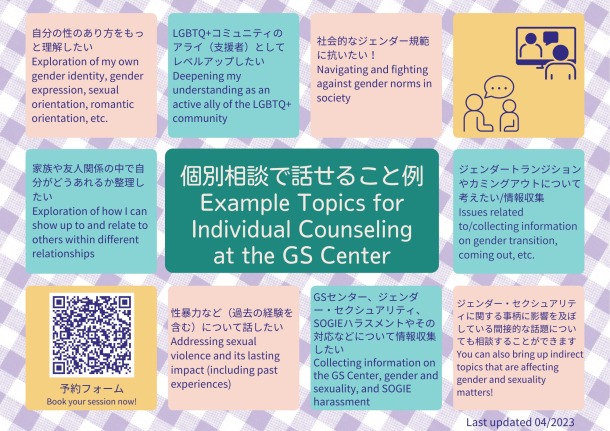
Gender and Sexuality Center
Gender and Sexuality Center operates at two locations.
[Main building] Toyama Campus Waseda University Student Center (Building No. 30) 1st floor 103
[Branch] Waseda Campus 10 Building No. Room 213
[Opening hours] Varies depending on the day of the week. Website Please check.
[E-mail] [email protected]
[Website] https://www.waseda.jp/inst/gscenter/
[X (formerly Twitter)] @gs_waseda
[Instagram] @gscenter.waseda
"WASEDA LGBTQ+ ALLY WEEKS 2024" is now underway!
Gender and Sexuality Center will be hosting "WASEDA LGBTQ+ ALLY WEEKS 2024" for two weeks from Monday, November 25th to Friday, December 6th, 2024. At Gender and Sexuality Center, we define an ally as "someone who is aware of their own privilege, willingly uses that privilege as a resource in movements toward justice for LGBTQ+ and related communities, and supports these activities."
The purpose of this event is to create a space where each LGBTQ+ person connected to Waseda University can recognize their own strength, and to make Waseda a comfortable place for everyone, regardless of sexual orientation, by making the presence of allies visible. The event will include a variety of events, from campus parades to lectures. For applications and details, please visit Gender and Sexuality Center website.
[About the Parade]
In 2024, the parade will be held on the following date and time with the theme of "WASEDA QUEER PARADES OF REMEMBRANCE". This is a popular event with over 100 participants every year. Walk-ins on the day are also welcome!
Tokorozawa Campus Monday, November 25th, 12:35-12:50 (Meeting place: in front of the guard room Building No. 100)
Toyama Campus Wednesday, November 27th, 12:35-12:50 (Meeting place: in front of Building No. 33)
Nishi-Waseda Campus Monday, December 2nd, 12:35-12:50 (Meeting place: Building 53 Building No.)
Waseda Campus December 4th (Wed) 12:35-12:50 (Meeting place: Between Building No. 11 and Building No.)
[Next Focus Preview] "Education System" to be released on Monday, December 2nd
▼Click here for details on each ALLY WEEKS project

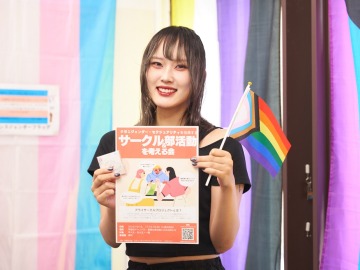
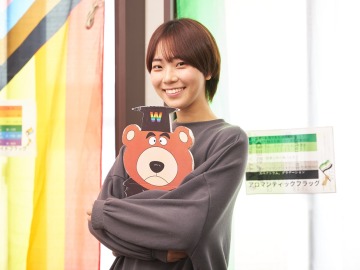
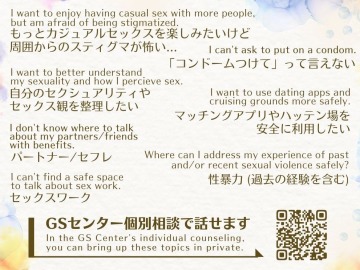
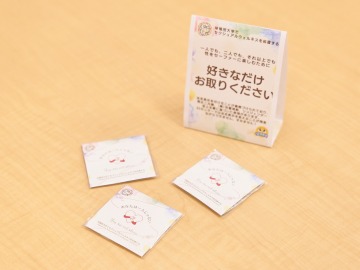
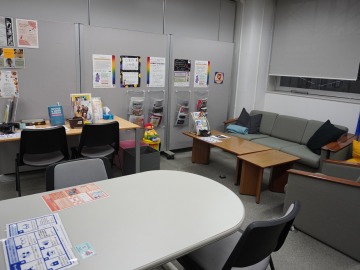
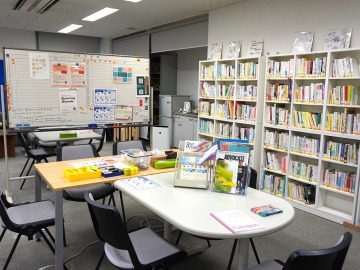
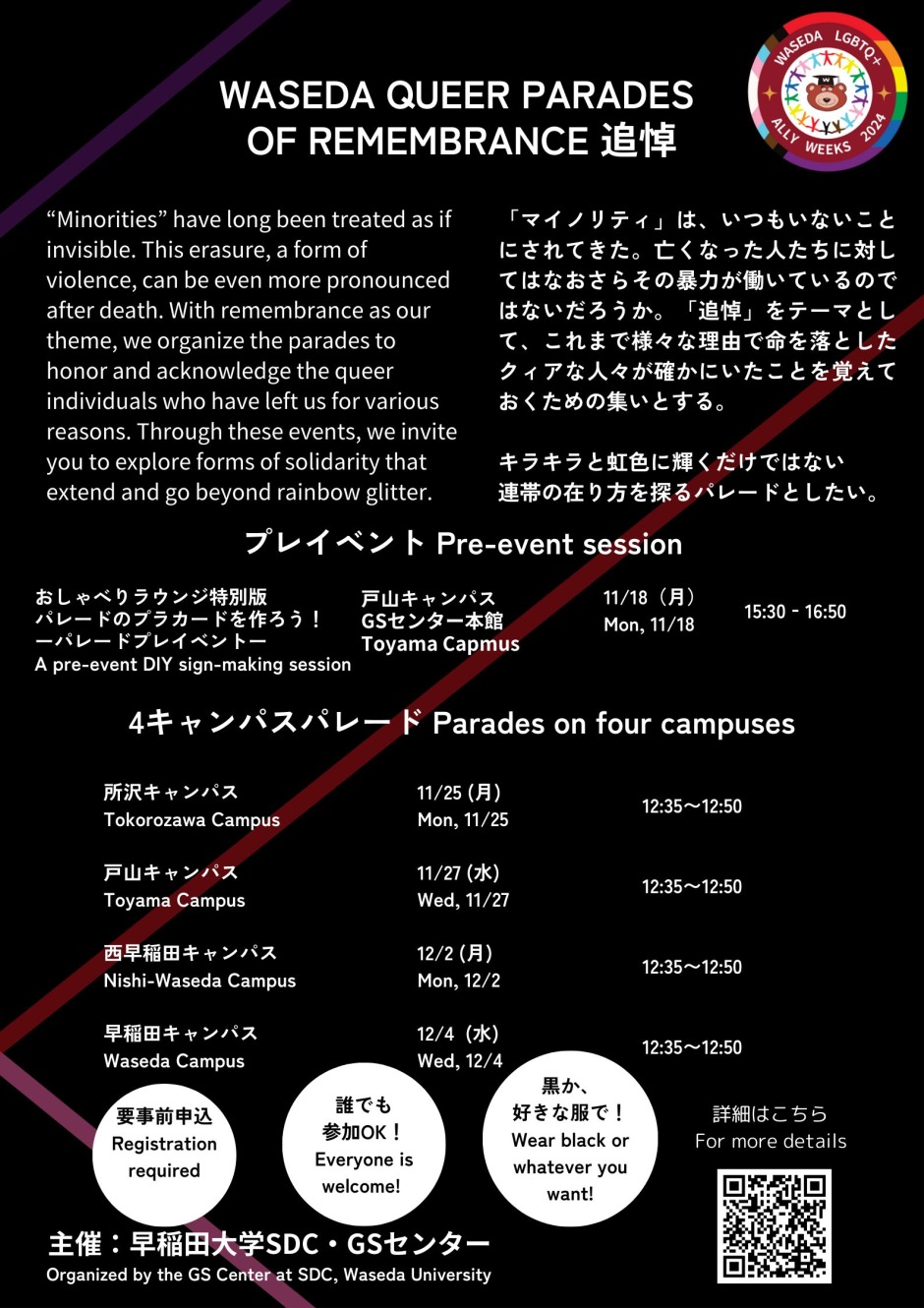
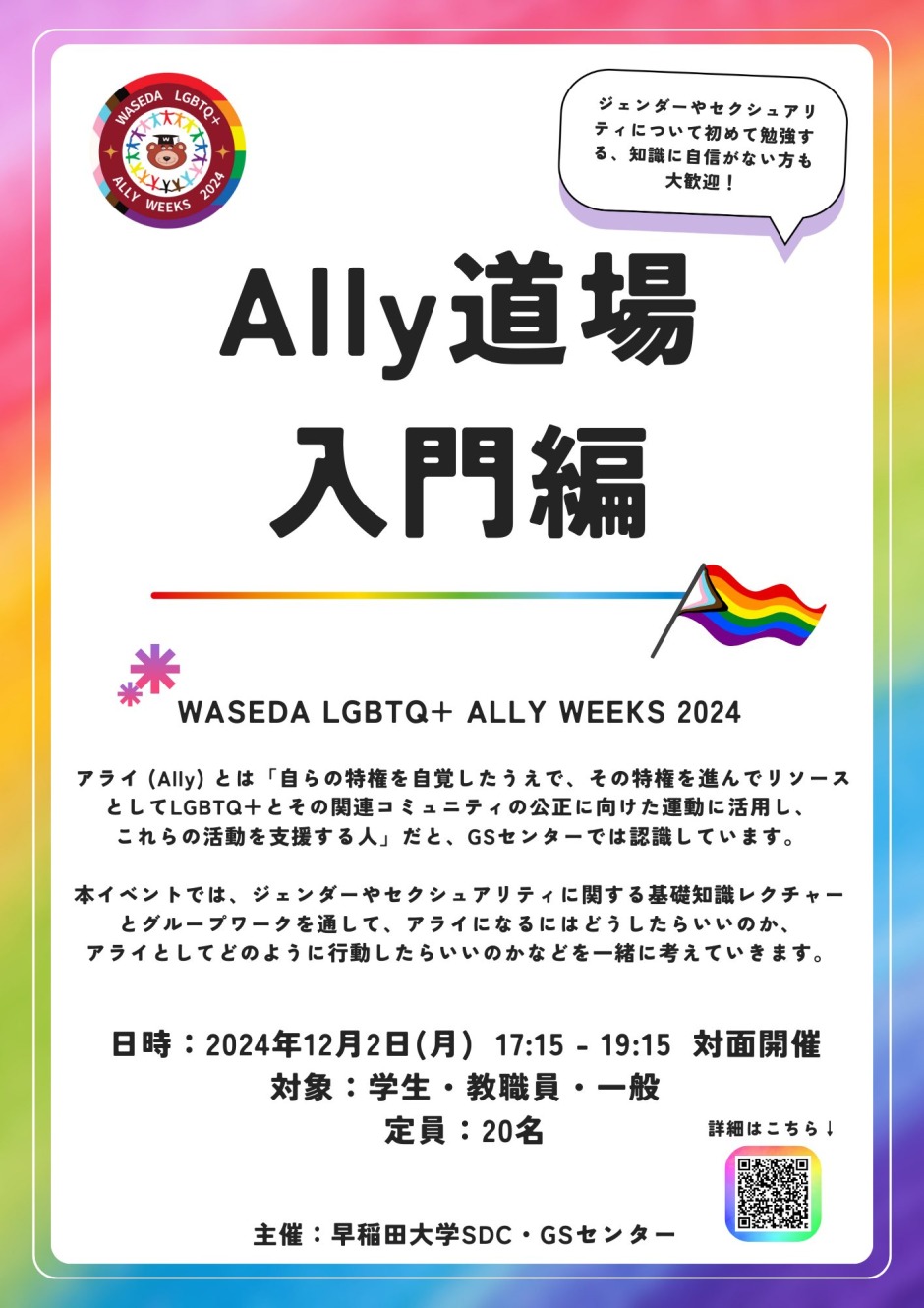
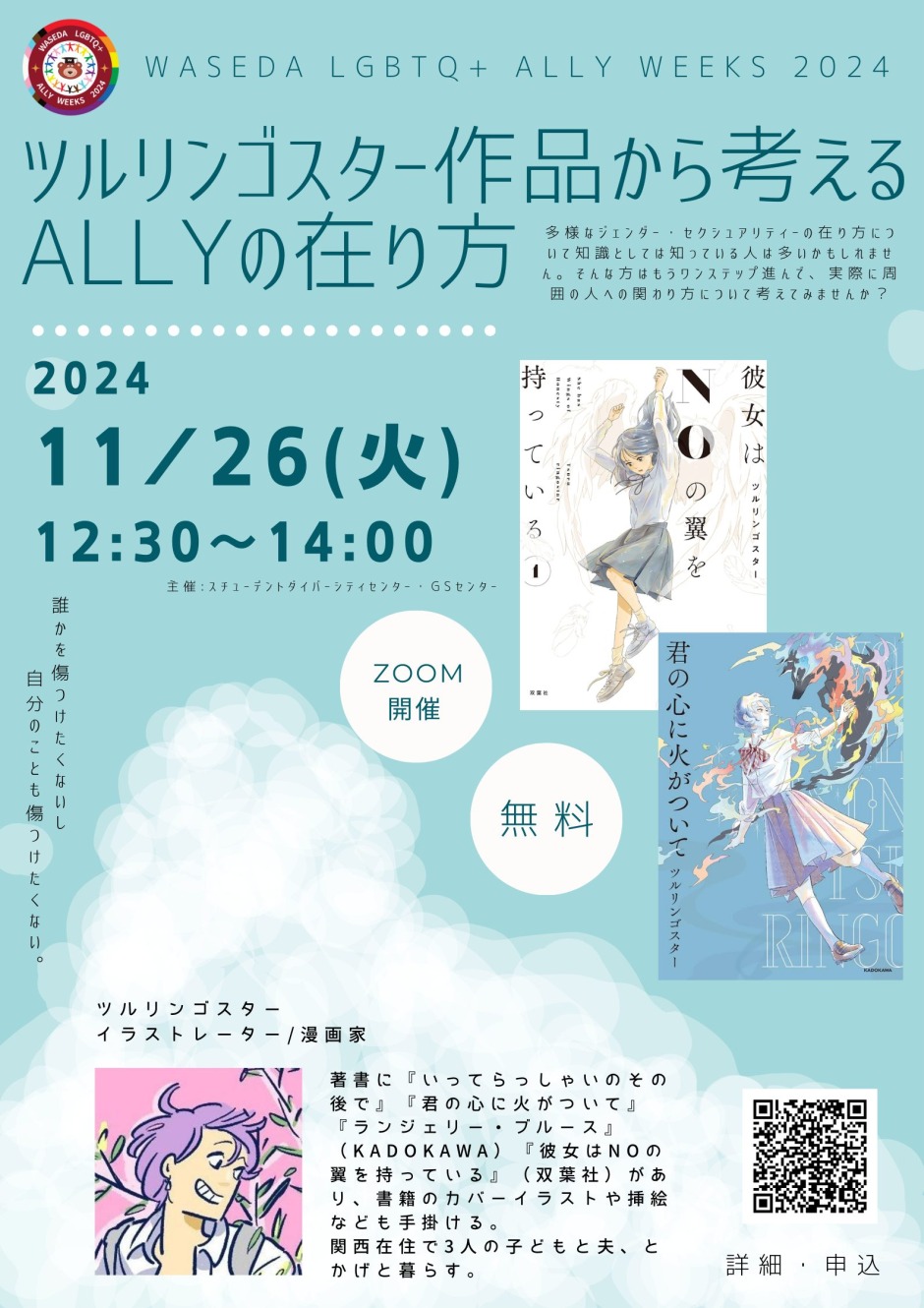
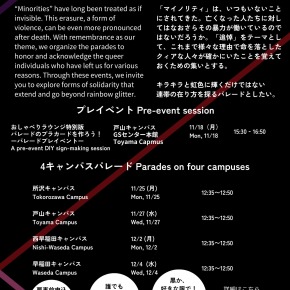
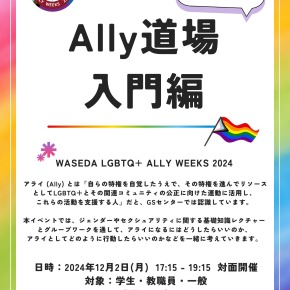
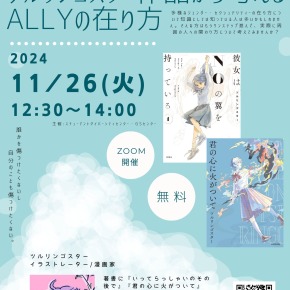
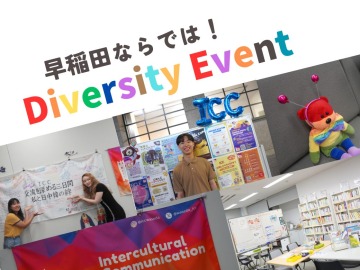
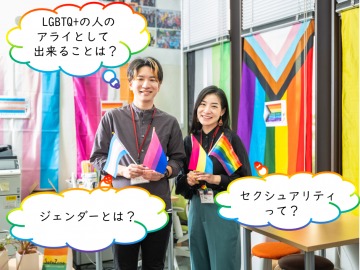
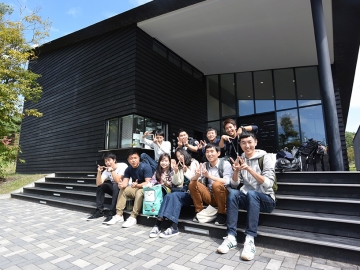
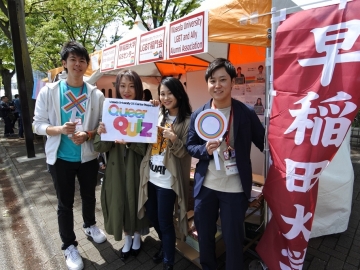

![[Save version] Map of the four main campuses](https://www.waseda.jp/inst/weekly/assets/uploads/2025/09/17cb2975123fc5103172ef60bd98608d-610x458.jpg)

